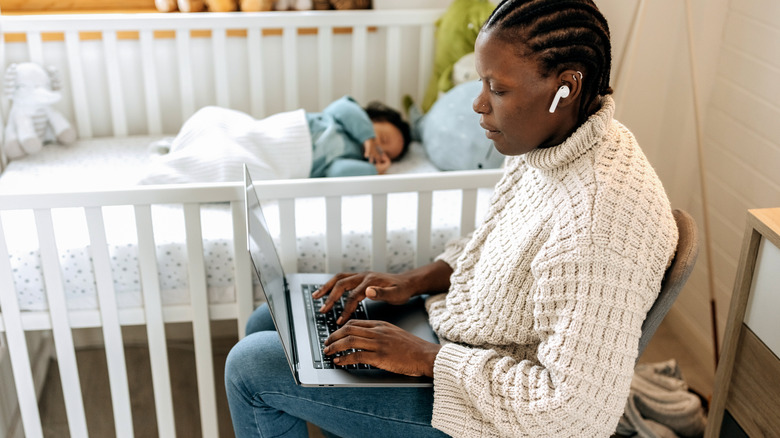The Motherhood Penalty Harms Moms In The Workforce But Children Continue To Benefit Working Dads
Though this will come as a surprise to almost no one, being a working mother is hard as hell. Despite a promising shrink in the gender pay gap during the 1980s and '90s, it has stalled in the last twenty years, with women/femme people earning just 82 cents to every dollar a man earns. Add this on top of the increasing financial toll of childcare and the abandoned legislation for federal childcare support, and you're left with parents across the US who are struggling financially. Mothers are consistently financially punished in their careers for choosing to have children, and this is referred to as "the motherhood penalty."
The motherhood penalty is rooted in the patriarchal notion that mothers are the primary caregivers in families, and therefore assume a greater obligation to take care of their children than father figures do. This often means that moms are expected to stay home in order to take care of their children, and that if they do still choose to work they are somehow less committed to their jobs. This penalty appears in the form of lower pay, fewer promotion opportunities, and increased difficulty getting hired. Now, before you think this is simply a downside of having kids, it's important to mention that fathers tend to experience the exact opposite. Known as the "fatherhood wage premium", many men actually experience positive changes to their careers for having had children. So why the gender disparity? It's complicated.
The motherhood penalty
A report from the U.S. Census Bureau found that in the three years surrounding the birth of a child (2 years before the birth and 1 year after), the earnings gap between opposite-sex spouses doubled. This earning gap continues to grow until the child reaches 10 years old, and even then the earnings gap never fully goes away. This means mothers are facing decades-long financial penalties for choosing to have a child. In fact, the researchers who coined the term 'motherhood penalty' found that moms experience an income penalty of 15% for every child under the age of five, with Black and Indigenous women facing a nearly 20% penalty.
To make matters worse, mothers experience a significant earnings drop (an average of $1,861) in the first quarter after giving birth. For moms who seek out new positions and workplaces, the penalties can be even worse. People who indicate their motherhood on job applications are less likely to be considered for a position, are offered less money if they are offered the job (an average of $11,000 less), and face lower workplace evaluations on their competency than non-mothers (10% lower). At every point in their professional career, people who become mothers are financially penalized and left with fewer opportunities than fathers. This economic stress can not only contribute to the rise of maternal ambivalence but can also impact a person's decision to have a child at all.
The fatherhood wage premium
Research shows that men experience rewards in the workplace for having children. A 2007 study from the American Journal of Sociology found that men with children were offered higher starting salaries than childless men, and research shows that fathers are more likely to be hired than childless men. Despite the push to more remote work-from-home positions and subsequent attempts for more equitability balanced parenting duties, the fatherhood premium is ultimately helped by the fact that most cisgender men are able to continually advance in their careers, without interruption, due to the disproportionate weight of childcare that still falls on mothers.
Joya Misra, professor of sociology and public policy at the University of Massachusetts, told Business Insider, "Men are often rewarded when they become fathers, because employers see men who have children and families as more reliable or breadwinners who are going to keep showing up and doing the work. Meanwhile, they might see mothers as not as reliable." A 2014 report found that those who became fathers, on average, experienced a 6% increase in their earnings, while mothers faced, on average, a 4% decline per child. An important thing to note is that, even though most men experience wage premiums, the largest increases go to college-educated White and Latino men in professional roles, while the smallest increases go to unmarried Black men without degrees in manual labor positions.
The cost of the pay gap
Despite a 1978 Act meant to protect women from discrimination on the basis of pregnancy and childbirth, women are still facing prejudice in the workplace. Professor Misra elaborated, "Before the act, if you told your employer you were pregnant, they could fire you then and there. Now, they can't do this. But unfortunately, it doesn't address the idea that employers might think you're worth less than another worker if you're pregnant."
In 2022, women-identifying people aged 25-34 earned 92 cents for every dollar earned by a man-identifying person. However, women aged 35-54 earned just 83 cents. (These statistics are even worse for women of color, with Black women earning 70 cents, and Hispanic women earning 65 cents). This noticeable drop in pay coincides with the ages most mothers are having and raising children. This wage gap persists even when you factor in education, work experience, and hours worked, further indicating that gender discrimination is truly at the heart of this issue.
To further complicate the motherhood penalty, the exorbitant cost of childcare (a 2021 report found that the average cost of center-based childcare is more than public college tuition in 34 states) can make the pay gap even more difficult to navigate. Along with creating financially untenable situations for mothers, these financial downsides are also contributing to parenthood in big ways, with 26% of parents under 40 saying they won't have more children due to finances, and 44% of non-parents saying they don't plan on having children at all.



